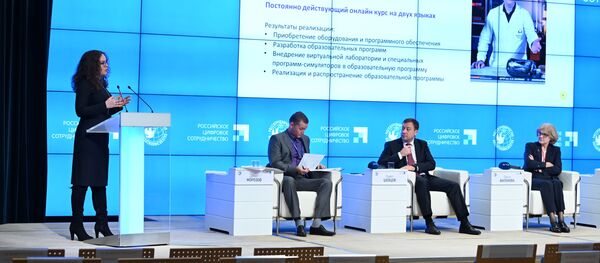Rossotrudnichestvo deputy chief Pavel Shevtsov describes the results of the federal project "Staff for a Digital Economy".
Sputnik: One of the key tasks for the project "Staff for a Digital Economy" was attracting foreign students to Russian universities. Why does Russia need foreign students?
Pavel Shevtsov: Attracting foreign students is part of the global race for the best minds. When we invite foreign students, we try to call in the most talented ones to show them the benefits of Russian education.
By inviting the best students and giving them a Russian education, we can proceed with two options. One option is that the foreign student returns to their homeland and promotes Russia's image abroad by using their top tier education to advance their career, thus becoming a kind of a "humanitarian" ambassador.
The second option is to give the foreign student a job offer in Russia itself if they wish to stay. In this case, they use their potential to develop the Russian economy and Russian living standards.
Sputnik: How was this project conceived?
Pavel Shevtsov: We aimed at several target groups when we were conceiving this project. The first is math and IT teachers in Russian schools abroad. We believe that the two-year experience of the project's implementation has shown that Russia possesses one of the best educational systems for teachers of math, IT, and Russian language.
We want to share this experience because there are many Russian schools abroad, where both our compatriots and representatives of other ethnic groups are being taught; they express vivid interest towards Russia and want to tie their lives to our country in the future.
Another target group for our project is of course foreign students. We want to attract foreign students and thus show ourselves to the rest of the world as a country able to provide high-quality and promising education.
The third are talented individuals that we want to give our education to, something which they can later utilise in their homeland or by staying to work in Russia.
Sputnik: How many countries and people did you manage to involve in this project over two years?
Pavel Shevtsov: We are still finalising the counting in regards to this year as many events were held online. Originally, we declared that 39 countries took part in it. But now, after communicating with the participants we found out that strictly speaking over 50 countries and over 30,000 were involved in the project.
We are glad that countries in Southeast Asia joined in. Our countries are actively cooperating in both humanitarian and IT spheres. We are presenting our digital worldview and are studying similar experiences presented by China and India.
Naturally, members of the Commonwealth of Independent States were involved. They have an affection for our system of education, and many of their citizens are planning to tie their future with Russia in some way.
Sputnik: Some of the projects were planned to happen offline in 2020. How did you manage to effectively adapt to the situation caused by the coronavirus pandemic?
Pavel Shevtsov: All of the projects were transferred to an online format. Naturally, while some projects reacted quickly, others long hoped that the pandemic and the problems caused by it would go away back in spring. Still, we showed a quick reaction to the shifting circumstances and all of the projects' KPI, which had been determined at the planning stage, were successfully achieved.
The pandemic created a completely new demand for the online format, but it's hard to forecast what will happen when it's over. We did notice a growing interest in our online projects, but a part of the digital technologies, such as VR, must be demonstrated in real life to new generations of students.
And, of course, we would like to receive feedback on our projects, but not via a soulless internet, but to see it with our own eyes via people's reactions. Only this can give you an understanding of how well you managed to reach out to people.
Sputnik: How will your projects develop further down the road?
Pavel Shevtsov: When we first conceived this project, we based it on the supposition that it should consist of viable programmes that will become financially self-sustainable and self-developing. We are confident that these projects will continue to develop actively and successfully because they enjoy unwavering interest now.
I can assure you based on both my and my colleagues' experience that Russia has much to offer in this field. We have taken a huge step forward when compared to many other European countries. Not to speak of other macroregions, which also see us as a beacon.
Right now our objective is to expand to Africa, where we're witnessing a spike in interest towards Russian education, Russian language, and our IT-technologies. I believe that we will be preparing and promoting our projects via Rossotrudnichestvo both in Africa and in Latin America in the near future.






